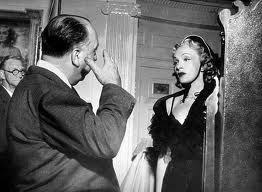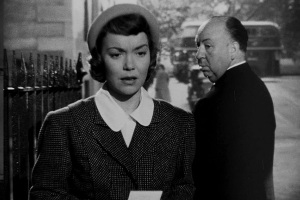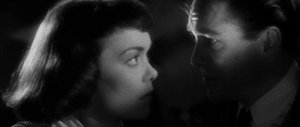
I'm a bit conflicted about what to include in this review, and what to leave out. Generally, I don't bother myself with being concerned about spoilers. Some of the movies I watch are 100 years old. What's the point of not "giving away" the plot points? Stage Fright is 61 years old (a great looking 60, granted), and if you know anything about it or even read a capsule review, you might already know. But I didn't know... at all. I didn't even know there was anything to know, so it's hard for me to judge how knowing would have affected my viewing and my reaction to the movie. See, now I've told you there something to know... and you know there's something to know, which I didn't know... agh! I will try to tip toe around the spoiler, and if all you know is that there's something to know, watch the movie before you know more.

Here's what is great about Stage Fright: it's thoroughly Hitchcockian. If you love Hitchcock, you know what I mean. From the score to the set up to the pacing to the shots, it's Hitchcock through and through. But Stage Fright also embraces that alternate side of Hitchcock which is typically absent from "golden era" Hitch films like Vertigo and Rear Window. That darkly humorous, wryly playful Hitchcock that shows up early and late in his career - think (the first) The Man Who Knew Too Much meets The Trouble with Harry - makes a rare '50s appearance in this movie.
Here's what's lacking in Stage Fright: great acting. True, we have the incomparable Marlene Dietrich, but I'm not sure Hitchcock really knows what to do with that kind of female personality. She's no delicate blonde doll after all, nor is she ever a straight up femme fatale. Dietrich is complicated and she feels a bit wasted in this movie. Jane Wyman takes the lead here and she's okay. But Jane Wyman is no Doris Day and Richard Todd can't even serve Jimmy Stewart a drink. Again, the actors are serviceable, just not fantastic.

The film starts, after the raising of "The Safety Curtain" on a theater stage, with something we expect from Alfred Hitchcock - a man wrongly accused a crime and a plucky sweetheart who believes him and is willing to work her tail off to prove him innocent. Then we're drawn into the stage actor's world, where everyone is overly dramatic and never, ever tells the truth. Eve Gill, that plucky gal, is a drama student and aspirining actress who is eager to try on the role of a Nancy Drew-ish girl detective, complete with false identities, fake accents, and physical disguises. Eve's father Commodore Gill (played by Alistair Sim) is deeply invested in fancying himself a smuggler. Dietrich's Charlotte Inwood plays the part of grieving widow like a champ, all the while lamenting the dreary blackness and prudery of widow's weeds. Through the power of narrative irony, we the viewers know what is true and what is not true, and we are dazzled by the piling on of lies, deceptions, half truths, and dissimulation. It's starting to feel like a meta-examination of the inherent falsehood of the craft of actors.

And then... well I'll stop. Hitchcock's Stage Fright takes a hard left. Not quite the narrative u-turn Psycho will take some years later, but a shocking, confounding, and (in its time) controversial turn. I'll say that the film becomes a meta-examination of the inherent falsehood of an entirely different kind of craft. If you haven't seen Stage Fright, go watch it. And before you get your knickers in a twist, remember, as Jean Luc-Goddard said, "Cinema is the most beautiful fraud in the world."
Further Reading (after watching of course!):
A very erudite examination of Stage Fright from Senses of Cinema.
A critical take from This Distracted Globe.
A closer look at the original work Stage Fright was adapted from.
Watch the theatrical trailer
[youtube http://www.youtube.com/watch?v=jSPDFY_i-uQ&w=425&h=349]
Watch a delightful compilation of Hitchcock cameo's, including Stage Fright
[youtube http://www.youtube.com/watch?v=qik6Va6RNqA&w=425&h=349]